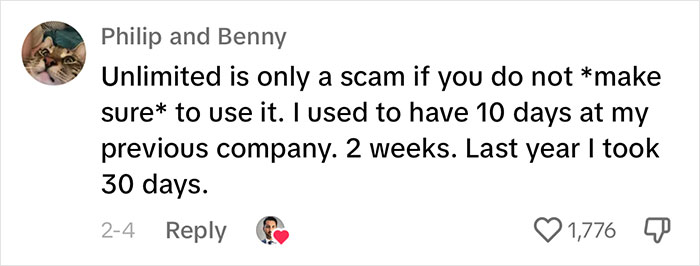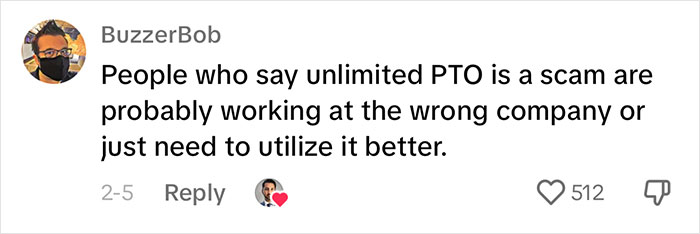A goodwork-life balanceis not a thing that many usually achieve with ease, as work, more often than not, outbalances the life aspect. Paid time off (PTO), however, is something that does help a lot in balancing this scale and is something that almost everybody values greatly.
When you’re looking for a new job and learn about a company offering an unlimited number of those ever-so-sweet paid days off, the first thought that probably hits your mind is that there could be nothing better than this. However, as thisemploymentlawyer on TikTok recently revealed, this type of deal is rarely as good as it sounds. Scroll down to read the full story!
More info:TikTok
Unlimited paid days off might sound like the perfect deal, but if you look closer, it may actually be a sugarcoated scam

Image credits:misteradvocatelawyer
“If I’ve got a choice between unlimited PTO, like some tech companies like to sell, or, like, a definite number, 21 days, 27 days of PTO, throughout the calendar year, I am always going to take the definite number of days of PTO”
“Not only does it allow me to increase year over year and ask for that as a form of compensation, but if I’m in a state like California, where I get to get paid out any PTO that I have accrued, I’m going to get a nice fat check along with my final check when I [resign] from that job. It seems to make a lot more sense, and it’s easily enforceable. When you have unlimited PTO, it’s kind of hard, at the end of the day, to determine if you’re owed anything because, you know, you took all the time you needed.”

Image credits:misteradvocate
Check out the full TikTok video:
One of his most recent videos became quite a hit, going viral with more than 560,000 views in just over a month. There, the man talked about why he always chooses a definite number of paid days off instead of an unlimited option, advising his viewers to do the same, as the latter is often a scam made to sound like a benefit.
The comment section was filled with varying opinions. Some people were of a very similar opinion, agreeing that the unlimited paid days off is ascam, while others argued that it really depends on how much you use it, your place of employment, and how this system is set up.

Image credits:olia danilevich (not the actual photo)
It is not surprising that there is so much debate about whether unlimited paid days off are more of a plus or a minus for companies and workers. After all, asCourtney Vinopal of HR Brewwrote, it is a relatively new benefit on the market.
In reality, the unlimited PTO system has its own fair share of pros and cons, like everything else. As an article inPTO Geniuspointed out, on the one hand, workers have more freedom and flexibility and don’t have to worry about using up their vacation or sick days when trying to balance their work and life.
From the company’s point of view, this type of benefit can also help with recruiting while also making PTO management easier. But, of course, the biggest advantage for the employer is the fact that unlimited PTO eliminates the huge financial liability of having to pay their employees for all their unused leave days when they depart from the company.
On the other hand, there is really no such thing as unlimited days off because, while the policy might not set the limit, the work culture definitely will do it instead. The lack of clarity makes it difficult to determine how much time you can take and how much the manager can approve.
When the days off are so undefined, policy abuse and even the risk of discrimination are also far from impossible. Additionally, vacation dates can easily overlap as they’re a lot more difficult to track, leading to a much more complicated process for everyone involved.

Image credits:Mateusz Dach (not the actual photo)
AsGeorge Dickson of Bonuslydefined it, the reason for this is that the unlimitedPTOsystem, while mostly well-meaning, is usually problematic. In this fast-paced world, and especially in startups where this type of benefit is most common, it’s not easy to feel like you have accomplished enough and find a window for a vacation when it always seems like there’s more work to do. In ever-so-common situations like these, when the number of possible days off is not well-defined, people may feel guilty stepping off work when there’s still more to be done.
But there’s rarely a situation without anysolution. For example, while offering unlimited PTO, some companies do still trackvacationdays in their organization. However, instead of limiting the maximum number, they target the minimum, letting their workers know how much time they’re expected to take for themselves. This type of approach not only eliminates the guilt factor but also leaves the workers feeling more autonomous and in control over how often they need to take time away from work.
The commenters had mixed opinions. Some agreed with the lawyer, and others said that it strongly depends on your situation





Image credits:Marc Mueller (not the actual photo)






Image credits:Niels from Slaapwijsheid.nl (not the actual photo)





Thanks! Check out the results:
Work & Money